Jiang Hu
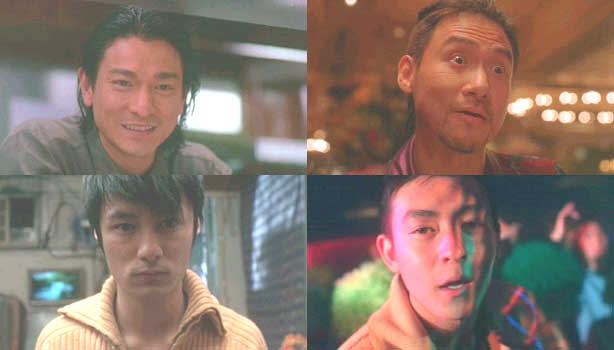
Director: Wong Ching-po
Year: 2004
Rating: 7.0
Last year I came
across a small independent film from Hong Kong called “Fu Bo” that didn’t
get much attention or fanfare. Though I didn’t particularly care for it due
to its disjointed elusive nature, I was still extremely impressed by the
artistic visuals, fluid film techniques and stylized editing from this debut
work of director Wong Ching Po and I thought it showed great promise for
his future. He just needed a more structured story to work with. Apparently
Eric Tsang who had a small part in that film felt the same way because in
his producer role he decided to hand over the director reins to Wong for
a much bigger film with a cast of some of the top actors in Hong Kong today.
I am not sure if the final result is at all what Tsang was looking for but
Wong has made an intriguingly opaque and visually splendid film about triad
life and the tenuous bonds of brotherhood that hold it together.
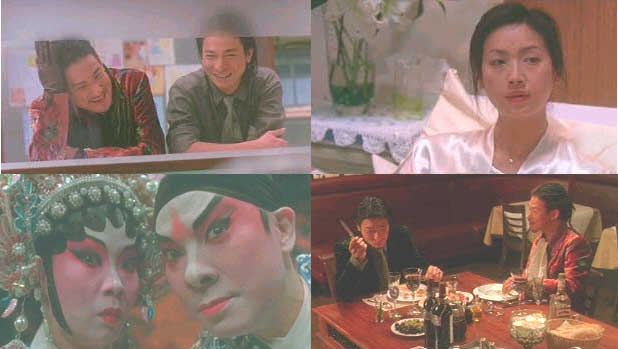
Pushed forward by a fabulously distinct musical score (by Mark Lui) and a
few well-placed ballads, the film crawls along at a measured pace in a poetically
lingering manner that is both dreamy and fatalistic. Time moves, but it seems
almost unreal, casual and unrushed punctuated continuously with stylistic
flourishes, gaudy close ups, unexpected colors and intricate set designs.
It is almost an out of body experience in which tables seemingly move, motion
slips backwards and today becomes yesterday. It takes place in the strangely
insulated and claustrophobic world of triads and their touch points – whether
women, discos or massage parlors – there are no cops in this world, no innocents
– this is the land of triads – Jiang Hu – and as in every world there is
a hierarchy in place with a set of rules and codes of conduct to be followed.
The film looks at both ends of this hierarchy in almost a musical counterpoint
as two separate lines interplay with each other and create a complete harmonic
tone poem. One line follows two young men in a triad coming of age story,
as they need to prove themselves and the other line explores two older triad
power brokers coming to terms with age, change, ambition and mortality. This
all plays out in a few quiet hours on a rainy night in Hong Kong.
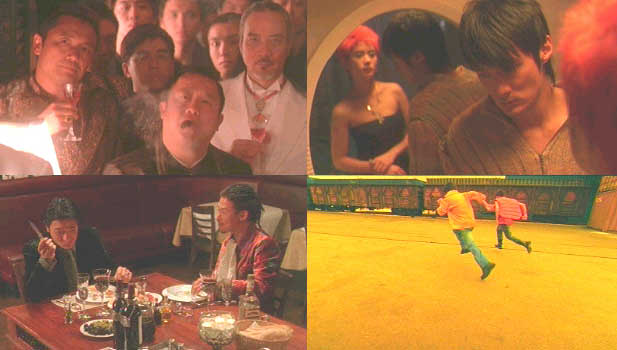
Triad head Andy Lau hears that a contract has been put out on his life –
a street punk has been hired to take him down – and he looks around his world
to see who might be behind it. There are three main suspects – smaller triad
gang heads who have pledged their allegiance to Andy but now may be looking
for more – Eric Tsang, Norman Tsui and Miu Kiu-wai. His second in command,
a dour dredlocked Jacky Cheung tells Andy that now that his wife (a welcome
Wu Chien-lien in her first Hong Kong film in far too long) has given birth
to a son that Andy should leave and retire to New Zealand – but is it friendly
advice or a threat? These two retire to a deserted restaurant and partake
in an almost Socratic dialogue as Andy tries to teach his friend and long-time
follower how to rule and command respect, but Jacky has already set things
in motion – “to clean house” – while Andy tries to counter his moves in a
game of triad chess in which the pieces that are taken off the board do so
in bloody fashion. But is he too part of Jacky’s house cleaning – he steps
out into the rain-drenched night to find out.
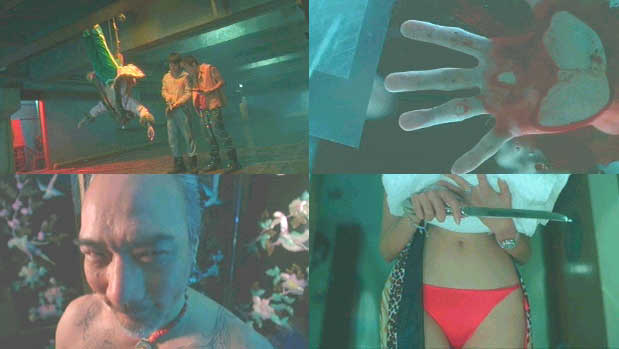
Shawn Yu and Edison Chen are two triad wannabe’s – they take orders for small
time hits from Chapman To (who seemed extremely bloated) – with Shawn doing
most of the dirty work and his more congenial friend hanging around him.
They want to move up though and when the offer comes to make a hit on a big
time triad leader they take it though they know their chances of survival
are slight – but to advance in this world you have to take chances or you
will always be a small potato. As a reward for a previous hit and to kill
time before the next one later that night Shawn is set up with a young prostitute
(Lin Yuan – who also sings one of the songs according to the credits) and
they make an emotional connection – she heartbreakingly demands that he make
it back to her after his assignment – “don’t worry about me, tonight worry
about yourself”. The word is out though that they have a contract to kill
and Edison is found and beaten to a pulp and forced to have sex with a dog
– Shawn goes to meet his destiny only in the company of a 10-inch blade.
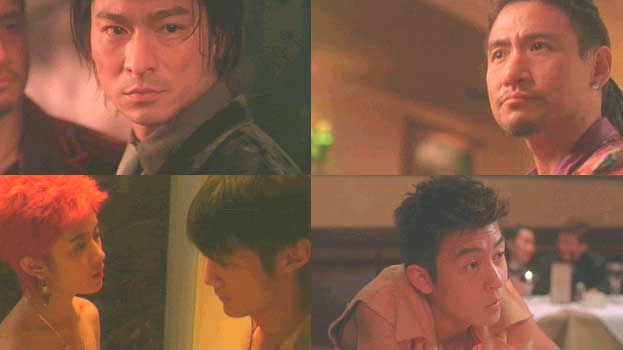
Restrained almost to a fault, the film doesn’t generate much electricity
but as the night moves towards its inevitable denouement the tension slowly
builds – the film has followed two sets of lives and one assumes they will
intersect at some point in a fatal mishap for some of them. But by this time
your loyalties have been spread out – Andy is almost noble in his use of
power – a philosopher king looking for wisdom – while Shawn has unexpectedly
been humanized by his discovery of love. In the end perhaps the story, pacing
and the grand emotions have been buried beneath the wall-to-wall style and
sound, but I found it to be a seductive exploration of triad life and even
more so on time and its effect on friendships and character.
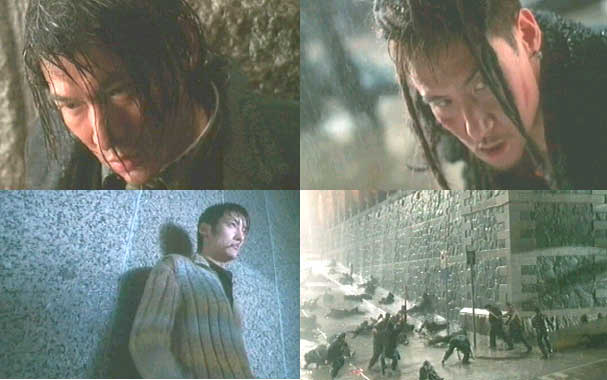
The final revelation – which apparently many see coming while I admittedly
did not because I guess I am not as smart as the average bear – can either
be seen as a cheap cinematic trick or as a clever device to force you to
re-evaluate all that has come before and layer on it the sad vagaries of
life. I think this is a fine second effort from Wong Ching Po. He still perhaps
needs to find his own distinct voice – one can sense influences or nods to
Wong Kar-wai in both style and images (the final fight has a certain Ashes
of Time feel to it – the Blind Swordsman fight in particular and another
moment reminds one of As Tears Go By – as does the casting of course) and
other classic triad dramas (it is probably no accident that Wu Chien-lien
was cast as Andy’s wife). I eagerly look forward to his next film.






